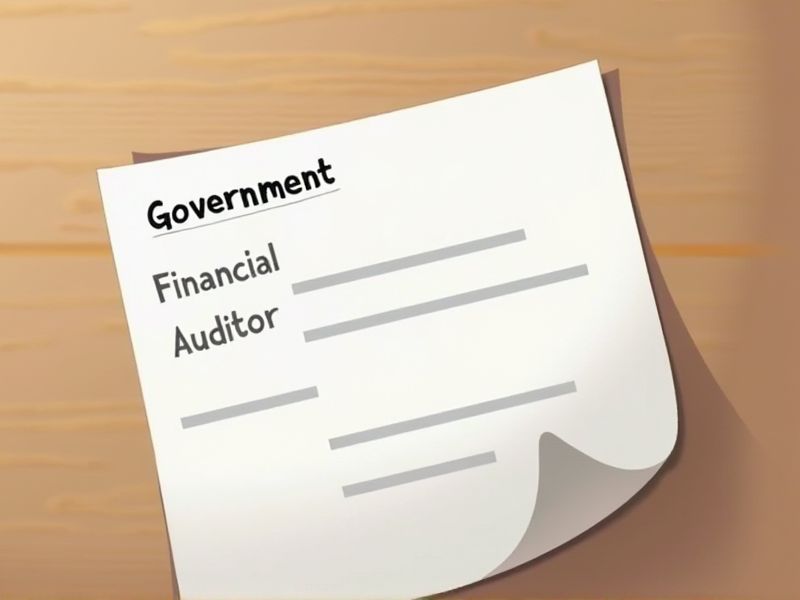
Government financial auditors play a crucial role in ensuring the accuracy and compliance of financial practices within public sectors, which demands a high level of expertise and integrity. Certifications provide auditors with the necessary knowledge and skills to effectively evaluate and enhance public financial accountability. They also help in standardizing practices, ensuring consistent application of auditing principles across various governmental departments. Key certifications that can enhance your qualifications as a government financial auditor include these essential credentials.
Certified Government Financial Manager (CGFM)
The Certified Government Financial Manager (CGFM) designation ensures that a government financial auditor is well-versed in the unique financial management and regulatory requirements specific to the public sector. Holding a CGFM credential enhances an auditor's credibility, offering assurance to stakeholders about their proficiency in governmental accounting and auditing standards. The robust training involved in obtaining the CGFM equips auditors with the skills needed to effectively identify financial discrepancies and inefficiencies within governmental entities. Possession of the CGFM can improve career prospects, as it distinguishes an auditor with specialized knowledge and commitment to the field of government financial management.
Certified Internal Auditor (CIA)
A Certified Internal Auditor brings a recognized standard of expertise in evaluating and improving financial controls, which directly enhances a government financial auditor's capacity to identify and mitigate risks. Obtaining the CIA designation ensures a comprehensive understanding of regulatory compliance, which is critical for government auditing amid increasing regulatory demands. The rigorous training and ethical guidelines adhered to by CIAs contribute to greater transparency and accountability in government financial audits. Data indicates that CIAs can identify efficiencies and savings opportunities, directly impacting resource allocation within government budgets.
Certified Public Accountant (CPA)
A Certified Public Accountant (CPA) is needed for a government financial auditor due to the rigorous financial standards and regulations that must be upheld, which CPAs are trained to navigate. CPA credentials ensure a high level of expertise in financial auditing and accountability, essential for assessing government programs and projects. The comprehensive knowledge CPAs possess in taxation, auditing, and financial reporting supports the integrity and accuracy of government financial statements. Government agencies rely on CPAs to identify financial discrepancies and enhance fiscal transparency, thereby maintaining public trust.
Certified Fraud Examiner (CFE)
Government financial audits aim to ensure that public funds are used appropriately and comply with regulations. A Certified Fraud Examiner (CFE) brings expertise in detecting and preventing fraudulent activities, critical in safeguarding against financial discrepancies. Having a CFE involved enhances the thoroughness of audits by identifying subtle signs of fraud that may not be evident during standard auditing processes. The incorporation of a CFE's skills reduces the risk of financial loss and increases public trust in governmental financial transparency.
Certified Information Systems Auditor (CISA)
The Certified Information Systems Auditor (CISA) credential enhances the ability to assess and manage IT risks in government financial systems. Increased reliance on technology in government operations necessitates auditors who understand both financial and IT controls. CISA certification equips auditors with the skills to ensure compliance with regulations and safeguard financial data integrity. As cybersecurity threats evolve, government auditors with a CISA can more effectively address vulnerabilities in financial systems.
Certified in Risk and Information Systems Control (CRISC)
Government financial auditors face complex risk environments, making CRISC certification vital for identifying and mitigating these risks effectively. The certification equips auditors with tools to enhance IT governance and manage information system risks, crucial in government settings where data security and accuracy are paramount. Possessing CRISC credentials signifies expertise in aligning risk management with enterprise strategies, a necessary skill for maintaining financial integrity in government audits. As cyber threats continue to evolve, CRISC ensures auditors stay adept in risk assessment methodologies, safeguarding public assets and information.
Certified Government Auditing Professional (CGAP)
Government entities manage large volumes of public funds, requiring rigorous oversight to ensure transparency and compliance, thus highlighting the need for a Certified Government Auditing Professional (CGAP). CGAPs possess specialized knowledge to navigate complex regulations unique to government accounting and auditing standards, directly impacting audit accuracy. The certification equips professionals with skills to detect inefficiencies and suggest improvements, enhancing financial operations and accountability. CGAPs contribute to fostering trust among the public by ensuring government financial statements and operations are conducted effectively and fraud is minimized.
Certified Management Accountant (CMA)
The CMA credential equips individuals with advanced financial analysis skills, critical for evaluating government financial practices. Government Financial Auditors benefit from deeper insights into budgeting and resource allocation through CMA knowledge. The strategic management expertise from a CMA enhances an auditor's ability to identify financial inefficiencies in governmental operations. Accountability and transparency in financial reporting are strengthened when auditors possess the CMA qualification.
Certified Treasury Professional (CTP)
A Certified Treasury Professional (CTP) certification equips government financial auditors with advanced knowledge in cash management, enabling effective fiscal oversight. Holding a CTP demonstrates an auditor's proficiency in financial regulations and risk management, crucial for maintaining public sector accountability. The certification enhances the ability to assess and ensure the financial health of governmental entities. CTP credentials can lead to more accurate financial audits, improving public trust in government financial reporting.
Certified Risk Management Assurance (CRMA)
The CRMA certification equips government financial auditors with specialized skills in assessing risk management processes, enhancing their ability to identify and mitigate potential financial risks. This credential signifies a credible proficiency in assurance and risk management, which is crucial for maintaining transparency and accountability in public finances. Government agencies increasingly face complex risk environments; possessing CRMA ensures auditors are well-prepared to navigate these challenges effectively. The CRMA enhances an auditor's capability to support organizational objectives through improved governance and risk oversight.
Summary
By obtaining certifications, you gain enhanced credibility and trust in your auditing work. This leads to more rigorous and effective evaluations of government financial practices, identifying potential inefficiencies or compliance issues. The acquired expertise enables you to provide actionable recommendations for improvement, fostering better financial management. Your enhanced qualifications can result in career advancement opportunities and recognition within the field.
